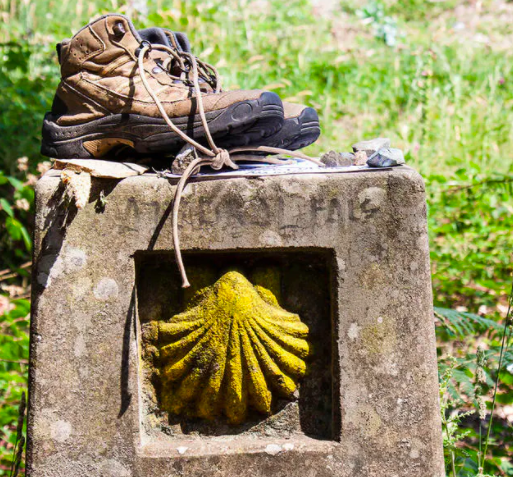A JOURNEY TO SANTIAGO - SAINT JACQUES DE COMPOSTELLE A PILGRIM’S PROGRESS
Lynne Burney Yashoda
Part 3 - Espagne 2002 - Anglais / Français (version française plus bas)
This story begins just before Easter in the year 2000. It spans 4 years and 3 seasons. As I tell the story I will pause to ask you, the reader or listener, a question which you may choose to answer or share it with others.
You will notice that I refer to this journey alternatively as le chemin de Saint Jacques, the Way of Saint James, El Camino or sometimes just as Compostella.
Episode 15 : Over the mountain
A year had passed. It was summer again. I knew the pilgrimage was working its subtle magic on my soul but I couldn’t say with any certainty exactly what that was when we began our journey again in August, 2002. I had continued weaving humoristic anecdotes about the first two years of walking the Camino into my opening sequence of each new class for trainee coaches. The mental and physical effort that the pilgrimage demanded of me was a perfect metaphor for the learning journey that they were  just beginning. It was also an opportunity for them to familiarize themselves with the tones and rhythms of a New Zealand voice speaking French words. I asked them to consider, as they listened, what was same as, or different from, their own experiences of previous learning journeys they had been on. At the end of my story, I asked them to share what of my story had impacted them with the “stranger” next to them in a way not unlike the conversations that were struck up in the evenings at hostels.
just beginning. It was also an opportunity for them to familiarize themselves with the tones and rhythms of a New Zealand voice speaking French words. I asked them to consider, as they listened, what was same as, or different from, their own experiences of previous learning journeys they had been on. At the end of my story, I asked them to share what of my story had impacted them with the “stranger” next to them in a way not unlike the conversations that were struck up in the evenings at hostels.
So, setting out in the summer of 2002 ready to tackle the passage across the mountains, the pilgrimage felt to me like it was an adventure still begging to be completed. I liked having a target. I was good at setting myself personal targets and achieving them. I had played sport at provincial and national levels in New Zealand so I knew about competition; winning and losing. I had only ever had one great sports coach and that was in my last year of high school. I don’t know if he was in love with my 15-year-old long legged body but I do know that he loved the way I dashed around a netball court sinking goal after goal, dazzling my own team members as well as the opposition. I shot 100 goals every lunch hour of every school day all winter for Mr. P and became ridiculously good at it. I basked in glory but the team was all about “me” and the coach couldn’t see anyone else. Then I left school and played in the big league and became as special as everyone else in the team. I was put on defense and never again shone as an attacking lone star goal shooter. I never had another sports coach I would wish to remember for their coaching skills but I did become a better team player. I don’t know if there is any connection between my sporting life in New Zealand and my eventually training people to become professional coaches in France but I do know that I love training high level sportsmen and women to become the coaches I wish I’d had. They know the terrain; they care about the person; they speak to the best in them; they confront them with their truths; they encourage them to find their own game and a place in the whole.
It was August 15th when we walked back into Saint Jean Pied de Port. We had taken trains and buses from Paris to a small town, Saint Palais, in the Basque Country where we had picked up the trail again. Our goal had been to loosen up the limbs and find our rhythm in preparation for the crossing of the Pyrenees. We had broken the 30K distance between Saint Palais and Saint Jean into two parts so we were not overly tired when, on the second night, we reached our hostel in Saint Jean. The day had been hot but the air was finally beginning to cool. The little streets were just as noisy as they had been the year before; full of ambling tourists, colorful wares and outdoor cafés. We took no time, this time, to wander from stall to stall, soaking up the holiday atmosphere. We were focused on what lay ahead of us the following day: the climb. We collected another mythical stamp from the pilgrims’ bureau, shopped at the local supermarket for our dinner that night and picnic the following day, unrolled our sleeping bags on two available bunks, showered, snacked and turned the lights out not long after dark.
The following morning, the dawn silence was broken by the sound of walking sticks tapping the cobbled stones outside our window. We rose quickly, packed, ate and joined the little flow of pilgrims setting out for the mountain pass.
And then it was straight up through low hung cloud. For 5 kilometers. To Hunto.
It is an abiding memory and it was repeated on many occasions: the brutal assault on lung and limb at the crack of dawn; out the door and up the mountain. Why? Because many villages we stopped at were nestled into valleys or on safe places on hillsides hence the need to move up to get out and go on.
And on that morning with only 780 kilometers left to walk, 27 of them that day, my legs reminded me that I spent most of the year living in a big city. I was fit because I did regular exercise during the year but the steepness of the ascent was a shock to the system. It was tough going. After a short breather in Hunto we kept going up. After what felt like a life time, we broke through the cloud into a dazzling blue sky.
And there we were.,
I am sipping my tea, above the cloud line at the foot of the virgin of Orisson. She gazes down at me from 1096 meters above sea level. She holds out her child, eyes cast downwards, lovingly; a kindly being whose love extends to me and all who look to her. Ever so briefly, I too feel like her special child. I feel the love that surpasses all understanding wrapping its arms around me. I feel the warmth of the sun on my face and a deep contentedness inside me. My eyes well up and it is hard to swallow. I notice that the blue of her inner robe matches the color of. the sky. Her love is vast..
We moved on up towards the sky. Mist swirled over summer pastures. We followed the trail of pilgrims and day trippers on up the mountain. We stopped briefly at a wooden cross. A simple barrier of 4 sticks tied together gave the monument wide berth. There were lots of ribbons knotted around the sticks; stones and a few scallop shells placed at the foot of the cross. I don’t remember the name of the monument and I was not sensitive to the history of the area but was touched by the unheard stories of each stone, shell and ribbon. Pilgrims had carried those stones and ribbons and sticks with them and had left them there with a purpose in mind. Each one of those objects had meant something to someone. Each one carried a story; an anecdote to someone’s life. I could only imagine what they might be but it was a lonely spot and it was misty. In my mind those stories held tears and prayers. Someone asked to be remembered in the stone he had left, the ribbon she had left and the stick they each had left. I acknowledged them by touching my hand to my heart as I passed on.
I don’t remember crossing into Spain: the moment when one foot was in France and the other in Spain and then when both feet could go either way.
National boundaries are strange things. At what point does the language change and different rules apply? When you fly from one country to another, airports and security procedures announce loud and clear: “you are here; not there”. But when you walk across a border there is nothing to tell you where you are; how do you know which bush is Spanish and which is French? Bushiness is not a national affair.
Spain or not, I recognized a familiar feeling on unfamiliar territory. My body begged release from its burden; my mind alternatively exhorted and cajoled it to go one more bend.
Question:
When you really don’t know how long something unpleasant will last, does your mind hope for the best or plan for the worst?
I remember the intense pleasure of being at the top of the Lepoeder Pass (1410 m). There were cars and cycles; hikers and pilgrims and a decision to make. We could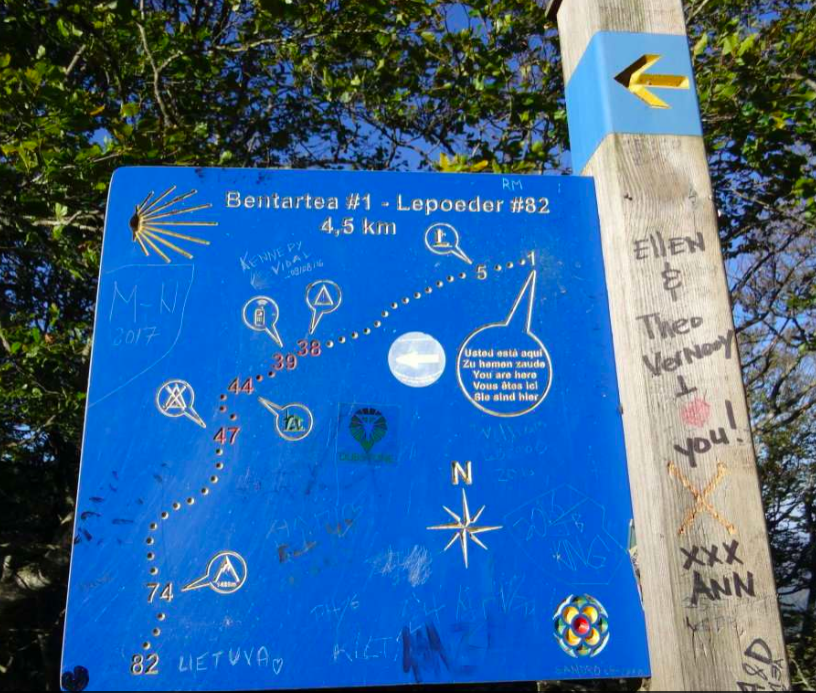 follow the road that wended gradually down to the Abbey of Roncesvalles or we could take the quicker route straight down through the forest. We looked at the cars, smelt the fumes; looked at the numbers, heard the chatter and headed for the forest.
follow the road that wended gradually down to the Abbey of Roncesvalles or we could take the quicker route straight down through the forest. We looked at the cars, smelt the fumes; looked at the numbers, heard the chatter and headed for the forest.
We read afterwards that it was a dangerous decision. While the bandits of the Middle Ages no longer hid out amongst the trees, the steep descent had wreaked havoc on the joints and tendons on many an unwary pilgrim.
I knew only the joy of literally bouncing down the mountain between oaks and beeches and firs; over a carpet of leaves, soft and brown beneath my boots.
We were Tigger and Roo in the Hundred Acre Wood.
“The birds sang.
We sang.
No, we didn’t.
Alright then.
We huffed
and puffed,
That’s right.
4 kilometers
Straight down.”
I loved it. There was no one but us. It was exhilarating. It was fun. It was crazy. But most of all, it was fast!
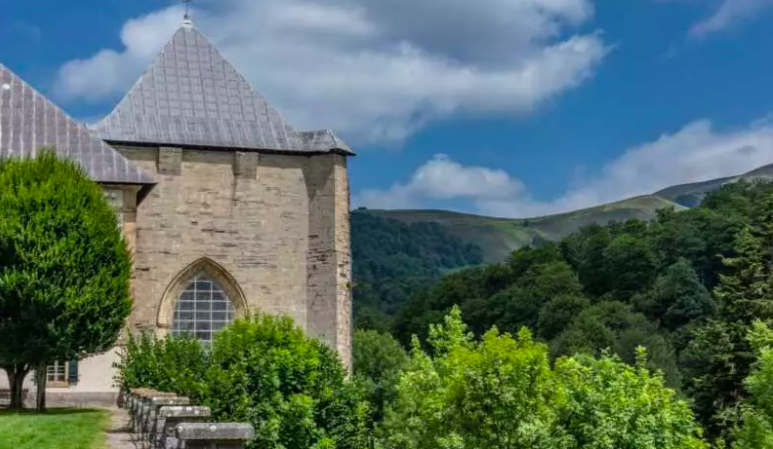 And then, there it was, the rooftops of the famous Abbey of Ronscesvalles. A bit further and we were at the door looking for a bed for the night. The dormitories were all full. Everyone spoke Spanish. No one spoke English. Or French. We got a room with a bathroom to ourselves. The long journey across the top of Spain to Santiago had begun. Marcillac was 2 years behind us. I was no longer a rookie pilgrim but my induction into El Camino des Espagnoles started right there in Ronscesvalles just on the other side of the mountain; just over the border. We were definitely no longer in France.
And then, there it was, the rooftops of the famous Abbey of Ronscesvalles. A bit further and we were at the door looking for a bed for the night. The dormitories were all full. Everyone spoke Spanish. No one spoke English. Or French. We got a room with a bathroom to ourselves. The long journey across the top of Spain to Santiago had begun. Marcillac was 2 years behind us. I was no longer a rookie pilgrim but my induction into El Camino des Espagnoles started right there in Ronscesvalles just on the other side of the mountain; just over the border. We were definitely no longer in France.
That evening we attended a mass in the abbey church. I felt less like a pilgrim and more like a tourist watching a theatrical performance. The actors were robed in rich emerald. Their movements were beautifully executed, elegant against a backdrop of dripping gold. Their script perfect voices were sonorous and melodious, lulling me with their foreign sounds. I listened attentively, uncomprehendingly, fascinated and unmoved for what may have been an hour. It was my induction into the Spanish expression of Catholicism; more exuberant and colorful than what was behind me in France.
 We moved on the following day to Biskarett and the day after that to Larrasoana.
We moved on the following day to Biskarett and the day after that to Larrasoana.
What I remember most about those two days is walking in woodland. I was walking well ahead of Richard – for once.. I came to a very large, high iron gate that farmers use to keep livestock in and intruders out. I stood in front of it contemplating the various ways I could scale it, crawl under it, shove my gear through it, squeeze my body between its bars.......
I was still scratching my head, ready to share my multiple thoughts and strategies with Richard when he strode up, took one look at it and without breaking his stride, opened it and walked straight on. The look of my face must have been a treat as it dawned on me what had just happened. The only thing I hadn’t thought about was actually looking for the handle. I couldn’t see it. It was on foreign territory. I was sure it would be a toughie to solve. I was convinced it would need discussion.
Richard threw a glance over his shoulder that said, “so what are you waiting for.” My face collapsed. I started laughing so hard I couldn’t stand up straight. Tears rolled down my face.
 Oh, the cruel irony of having my pride flung in my face by an open gate. It was payback time for the number of times the super practical Kiwi me had scoffed at the intellectual but useless Frenchman Richard. The Kiwi was flummoxed by a giant gate that wasn’t even locked. The Frenchman just saw a gate and turned the handle.
Oh, the cruel irony of having my pride flung in my face by an open gate. It was payback time for the number of times the super practical Kiwi me had scoffed at the intellectual but useless Frenchman Richard. The Kiwi was flummoxed by a giant gate that wasn’t even locked. The Frenchman just saw a gate and turned the handle.
My belief that Frenchmen notably Parisians were intellectuals and couldn’t change a light bulb if their life depended on it was formed early on in my life in France. Back in 1980, I was driving a Renault 5 down to Marseille from Paris when one of its tyres got a puncture. Despite my liberal thinking around male and female stereotypes I had always assumed that changing a tyre on a car was a skill performed by men like my Dad. Logically, then, I turned to the three young men accompanying me on this voyage down south. All three, including my then husband, had degrees from France’s top graduate schools. They represented the crème de la crème of France’s intellectual elite. BUT they had studied history and philosophy and political science. NOT how to change a tyre on a Renault 5. I sat in the driver’s seat watching them pore over the car manual looking for clues. They debated the pros and cons of various approaches to the problem without ever once checking what tools were actually available to perform the task. They had a marvelous time all the while chuckling away at their ineptitude as it were something that went with the territory of the intellectually superior. I just wanted to get my Dad out of bed in NZ and say, “Will you please tell these froggies how to change a bloody tyre!”
I eventually flagged down another motorist who found the car jack in the boot of the car and followed up with an excellent demonstration on how to change a tyre. He received much acclaim from us all and the journey to Marseille continued..
My intellectual approach to the farm gate told me how long I had been in France and how much its culture of reflection before action had rubbed off on me.
I chuckled and chortled all the way to Biskarret, our first stop after Ronscesvalles.
Questions:
What do you really pride yourself on?
Have you ever been made to eat humble pie in regard to this?
Episode 15 : Par-delà la montagne
Le 15 août 2002, nous étions de retour à Saint Jean Pied de Port. Nous avions pris des trains et des bus pour rejoindre la petite bourgade de Saint Palais, au Pays Basque. Nous avions aussi un peu marché, en préparation de la traversée des Pyrénées.
Cette fois pas d’arrêt pour l’achat de produits chez l’artisan du cru et ses cuirs. Nous avons dormi à la même auberge qu’un an plutôt, collecté un autre timbre mythique dans notre crédencial, prêts à partir comme des flèches, direction la montagne.
Tout droit
Pour 5 kilomètres.
Jusqu’à Hunto.
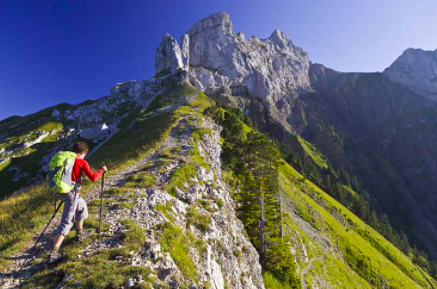 C’est un souvenir impérissable, répété à de nombreuses reprises: à l’aube, la charge brutale sur les poumons et les membres quand on franchit le seuil pour grimper plus haut vers la montagne.
C’est un souvenir impérissable, répété à de nombreuses reprises: à l’aube, la charge brutale sur les poumons et les membres quand on franchit le seuil pour grimper plus haut vers la montagne.
Ce matin-là, alors qu’il ne restait que 780 kilomètres à parcourir, dont 27 le jour même, mon statut de pèlerin venu de la grande ville, loin de chez moi, s’est trouvé confirmé. J’étais en forme, mais c’était dur. Après une courte pause à Hunto, nous avons continué à prendre de la hauteur, traversant les nuages jusqu’à atteindre un ciel bleu éblouissant.
Il y a une photo de moi sirotant mon thé au-dessus de la ligne nuageuse au pied de la vierge d’Orisson. Elle me regarde de ses 1096 mètres au-dessus du ni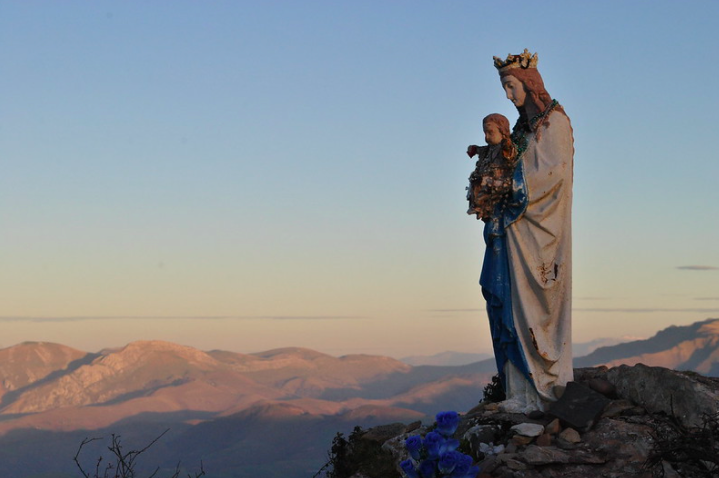 veau de la mer. Comme une offrande, elle tend l’enfant entre ses bras, les yeux baissés, avec amour. Tout son être est bienveillant et son amour m’envahie moi aussi. Le bleu de sa robe s’accorde à la couleur du ciel.
veau de la mer. Comme une offrande, elle tend l’enfant entre ses bras, les yeux baissés, avec amour. Tout son être est bienveillant et son amour m’envahie moi aussi. Le bleu de sa robe s’accorde à la couleur du ciel.
Nous grimpons vers le ciel. La brume tourbillonne sur les pâturages d’été. Nous suivons la piste des pèlerins et des excursionnistes à la journée et . nous sommes arrêtés brièvement devant une croix en bois. C’est une simple barrière de 4 bâtons liés ensemble qui donne au monument une large assise. Il y avait beaucoup de rubans noués autour des bâtons, des pierres et de quelques coquilles placés au pied de la croix. Je ne me souviens pas du nom du monument et je n’étais pas très impliquée dans l’histoire de la région, mais j’ai été touché par les histoires silencieuses que racontait chaque pierre, coquilles et rubans.
Je ne me souviens pas non plus d’avoir traversé la frontière avec l’Espagne: ce moment où l’on a un pied en France et l’autre en Espagne et puis quand les deux pieds vont à nouveau ensemble dans le même sens.
Les frontières nationales sont des choses étranges. À quel moment la langue change-t-elle et différentes règles s’appliquent-elles? Lorsque vous volez d’un pays à l’autre, les aéroports et les procédures de sécurité annoncent haut et fort : « vous êtes ici; pas là ». Mais quand vous traversez à pied une frontière, il n’y a rien pour vous dire où vous êtes; comment savez-vous que tel buisson est espagnol et tel autre français? Le domaine du buissonneux n’est pas une affaire nationale.
Espagne ou pas, j’ai reconnu ce sentiment familier émanant d’un territoire inconnu. Mon corps suppliait d’être libéré de son fardeau alors que ma tête m’exhortait ou me cajolait, alternativement, d’aller de l’avant, encore un virage.
Question
- Quand vous ne savez vraiment pas combien de temps quelque chose de désagréable durera, votre esprit espère-t-il pour le meilleur ou se prépare-t-il pour le pire?
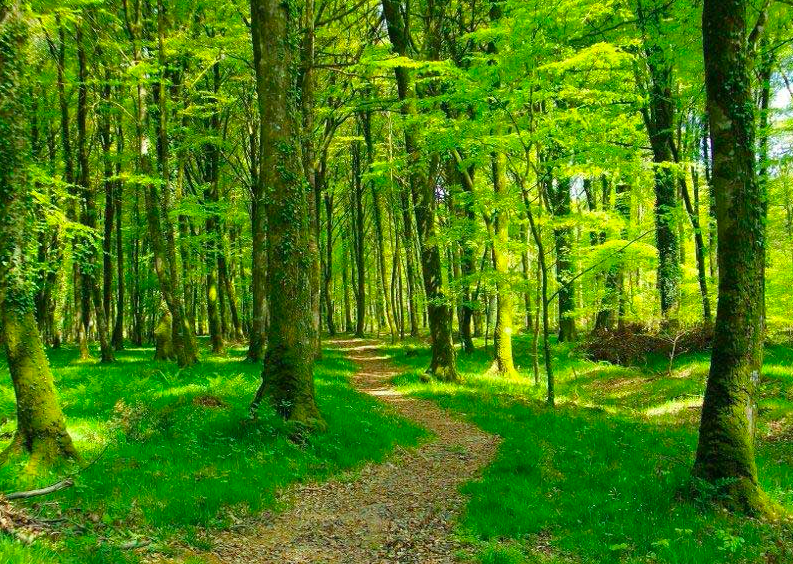
Je me souviens, en revanche, de l’intense plaisir d’être au sommet du col de Lepoeder (1410 m). Il y avait des voitures et des cyclistes, des randonneurs, des pèlerins et une décision à prendre. Suivre la route qui se dirigeait vers l’abbaye de Roncesvalles ou bien prendre la plus rapide, tout droit à travers la forêt. Nous avons regardé les voitures, reniflé les gazs d’échappement, considéré les chiffres, écouté les bavardages alentours et piqué vers la forêt.
Nous avons lu par la suite que c’était une décision hasardeuse. Car si les bandits du Moyen Age ne sont plus là à se cacher derrière les arbres, la pente faisait des ravages sur les articulations et les tendons de nombreux pèlerins imprudents.
Personnellement, Je ne connaissais que la joie de rebondir, littéralement, sur les massifs de chênes, d’hêtres et de sapins, portée par un tapis de feuilles, doux et brun sous mes bottes. Nous étions Tigrou et Petit gourou dans la forêt des rêves bleus.
Les oiseaux chantaient.
On a chanté.
Non, on n’a pas chanté.
D’accord, alors,
Nous avons soufflé
et soufflé encore
Exactement
Pendant 4 kilomètres
Tout droit vers en bas
J’ai adoré. Il n’y avait personne d’autre que nous. C’était exaltant. C’était amusant. C’était dingue. Mais surtout c’était rapide !
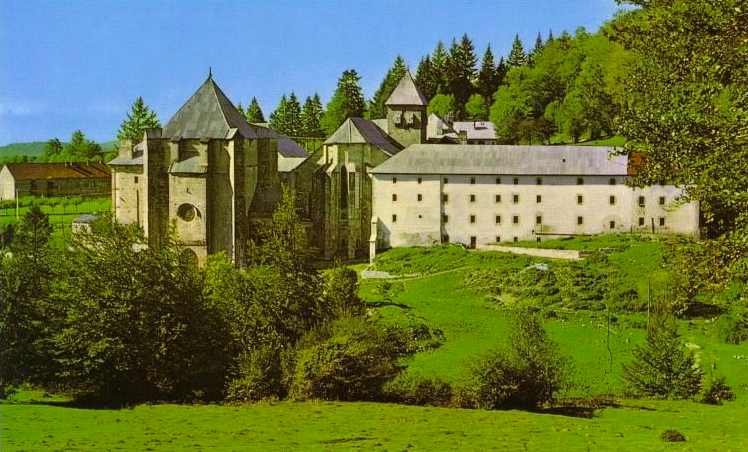 Et puis, ils étaient là, les toits de la célèbre abbaye de Ronscesvalles. Un peu plus loin encore et nous étions à sa porte en quête d’un lit pour la nuit. Les dortoirs étaient tous complets. Tout le monde parlait espagnol. Personne ne parlait anglais. Ni français. Mais l’argent, lui, a parlé et nous avons eu une chambre avec une salle de bains pour nous seuls. Le long voyage à travers le relief de l’Espagne vers Santiago avait commencé. Marcillac était loin, à 2 ans de là. Je n’étais plus un pèlerin de la première heure, mon initiation au Camino des espagnols commençait juste là à Ronscesvalles juste de l’autre côté de la montagne; juste de l’autre côté de la frontière. Et certainement plus en France.
Et puis, ils étaient là, les toits de la célèbre abbaye de Ronscesvalles. Un peu plus loin encore et nous étions à sa porte en quête d’un lit pour la nuit. Les dortoirs étaient tous complets. Tout le monde parlait espagnol. Personne ne parlait anglais. Ni français. Mais l’argent, lui, a parlé et nous avons eu une chambre avec une salle de bains pour nous seuls. Le long voyage à travers le relief de l’Espagne vers Santiago avait commencé. Marcillac était loin, à 2 ans de là. Je n’étais plus un pèlerin de la première heure, mon initiation au Camino des espagnols commençait juste là à Ronscesvalles juste de l’autre côté de la montagne; juste de l’autre côté de la frontière. Et certainement plus en France.
Ce soir-là, nous avons assisté à une messe dans l’abbaye. J’étais un touriste assistant à une représentation théâtrale. Les acteurs étaient vêtus d’une riche couleur émeraude. Leurs mouvements étaient magnifiquement exécutés sur fond d’ors dégoulinant. Leurs voix étaient sonores et mélodieuses. Ils étaient script parfait. Mon attention fut facilement captivée. Mais je restais totalement insensible.
Nous avons pris la route le lendemain pour Biskarett et le sur lendemain pour Larrasoana.
Mes souvenirs de ces deux jours sont flous, sauf pour un événement:
Nous marchions dans les bois. J’étais loin devant. Je suis arrivé à une très grande porte de fer du genre de celle qu’un agriculteur utilise pour protéger le bétail et se garder des intrus. Je me tenais devant elle en considérant les différentes façons dont je pouvais l’escalader, ramper dessous, pousser mon équipement à travers, presser mon corps entre ses barreaux .......
J’étais encore en train de me gratter la tête, prête à partager mes multiples pensées et stratégies avec Richard quand il s’est levé, a jeté un coup d’oeil et sans changer d’allure, dans la foulée, a ouvert le portail et poursuivi droit devant.
Il ne m’’était même pas venu à l’esprit de simplement ouvrir le portail
! Richard jeta un regard par-dessus son épaule pour dire : « alors qu’est ce que tu attends ? » Et c’est tout. J’ai commencé à rire si fort que j’étais pliée en deux avec des larmes qui coulaient sur le visage.
Oh l’ironie cruelle que d’avoir sa fierté jetée au visage par une porte ouverte. C’était le temps du retour à l’envoyeur pour le nombre de fois que le super pratique Kiwi, moi, s’était moqué de l’intellectuel mais inutile Français, Richard. Le Kiwi restait décontenancé devant une porte géante et même pas verrouillée. Le Français avait vu une porte et tourné la poignée.
moi, s’était moqué de l’intellectuel mais inutile Français, Richard. Le Kiwi restait décontenancé devant une porte géante et même pas verrouillée. Le Français avait vu une porte et tourné la poignée.
Je m’étais accrochée au préjugé qui suit depuis mes premières années en France, dans les années 80. Conduisant une R5 de Paris à Marseille j’avais été victime d’une crevaison. En dépit de mes vues libérales quant aux stéréotypes relatifs à ce qu’on pouvait attendre d’un homme par rapport une femme, j’avais toujours présupposé que changer un pneu revenait aux males de l’espèce. Il était donc logique que je me retourne vers mes trois compagnons de route à destination du sud. Tous trois – dont, à l’époque mon mari – étaient issus du système des grandes écoles. La crème de la crème de l’élite intellectuelle française en quelque sorte. Eux avaient étudiés l’Histoire, la philosophie, les sciences politiques, mais PAS comment changer un pneu sur une R5. Assise à la place du pilote, je les observais décortiquant le manuel de bord à la recherche d’indices. Ils dèbâtèrent le pour et le contre de telle ou telle approche sans une seule fois vérifier de quel outil nous disposions pour mener à bien l’opération. Ils passèrent ainsi un bon moment à rigoler de leur inaptitude. Comme s’il s’agissait là de quelque chose appartenant au territoire des intellectuellement supérieur. Je n’avais qu’une seule envie, téléphoner et réveiller mon père en Nouvelle Zélande et l’entendre dire « S’il vous plait que quelqu’un disent à ces mangeurs de grenouilles comment changer un fichu pneu ! » pour le reste je n’ai aucun souvenir de comment nous sommes finalement arrivés à Marseille.
Quant à l’affaire du portail, j’en ai ri et gloussé tout le chemin jusqu’à Biskarret, notre premier arrêt après Ronscesvalles.
Questions
- De quoi êtes-vous vraiment fier ?
- Avez-vous déjà été conduit à ravaler votre salive et faire amende honorable ?
